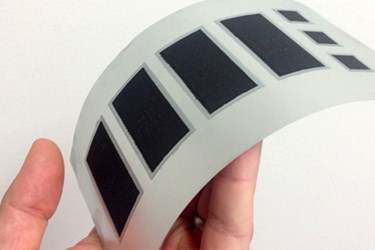Printable, Flexible, Rechargeable Batteries For Medical Devices
By Joel Lindsey

Imprint Energy, a California-based startup, has developed ultra-thin, flexible, zinc-polymer rechargeable batteries that could have a significant impact on the field of wearable medical devices.
According to a recent article from the MIT Technology Review, the key to the new batteries is that they were designed using zinc coupled with a specialized solid polymer electrolyte.
“The batteries combine the best features of thin-film batteries and printed batteries,” Brooks Kincaid, cofounder and president of Imprint Energy, said in the MIT article. “Such thin-film batteries tend to be rechargeable, but they contain the reactive element, have limited capacity, and are expensive to manufacture. Printed batteries are nonrechargeable, but they are cheap to make, typically use zinc, and offer higher capacity.”
Researchers at Imprint Energy said they chose to work with zinc because it is more stable than lithium, which is found in most batteries but is so reactive that it must be protected with bulky additional structures. While zinc presents a more stable option, traditional zinc batteries react with water-based electrolytes to create branch-like structures called dendrites that can short the battery, according to the article.
To overcome this obstacle and to make zinc a more viable possibility, the researchers from Imprint Energy developed a solid polymer electrolyte that works well with zinc — preventing the growth of dendrites and providing greater recharging capacity and better stability.
According to the MIT article, using zinc enhances the product’s manufacturability. Not only can the batteries be printed inexpensively using common industrial screen printers, but the company does not need the protective equipment necessary for producing lithium batteries.
Company cofounder Christine Ho said that Imprint Energy’s batteries could significantly affect the field of wearable medical devices, and that the batteries could be used in a variety of health-related applications. The company recently began working on a project with the U.S. military to design batteries that could be used in devices for monitoring and tracking the health status of soldiers in the field, according to the MIT article.
Image Credit: Imprint Energy
